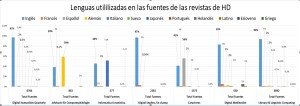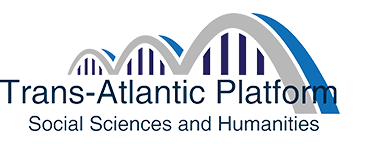
Domenico Fiormonte has written a nice essay on how the humanities (and digital humanities) run the risk of becoming monolingual, Towards monocultural (digital) Humanities?. The essay is a response to Greg Crane’s The Big Humanities, National Identity and the Digital Humanities in Germany and Greg responds then to Domenico here. The numbers are depressing (see the graphs from Domenico above). As he puts it (drawing on research with a colleague into DH journals):
These data show that the real problem is not that English is the dominant language of academic publications (and of DH), but that both Anglophone and a high percentage of non-Anglophone colleagues barely use/quote non-Anglophone sources in their research.
I can’t help thinking that the internet has allowed the big to get even bigger. The dominance of English in academic circles is exacerbated by the instant availability of English research. National languages don’t even have location as an advantage on the internet.
What can we do about it? Miran had a nice reply on Humanist (to the original posting by Greg Crane that was also on Humanist.) Domenico suggests that we all have to take some responsibility, especially those of us who have the “free ride” of being native English writers.
It is the responsibility of dominant languages and cultures to translate from marginal or less influential languages.

